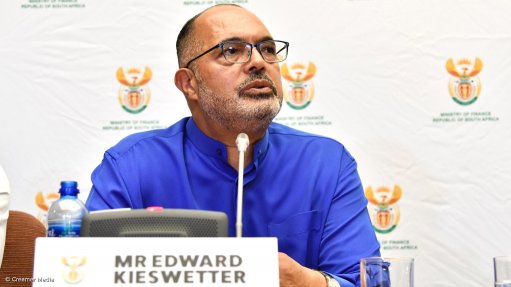
Edward Kieswetter
Photo by: Creamer Media's Donna Slater
The economic fallout from the recent Moody’s downgrade and the country’s response to the Covid-19 pandemic would have a “significant impact” on revenue collection during the 2020/21 fiscal year; however, South African Revenue Service (Sars) Commissioner Edward Kieswetter said that it was not yet possible to offer an accurate assessment of the possible impact.
Finance Minister Tito Mboweni announced in February that government would aim to raise revenue of R1.43-trillion in 2020/21 and was only officially scheduled to provide an update to the figure during the Medium-Term Budget Policy Statement in October.
Already several tax policy adjustments had been made in response to the impact on businesses and individuals of South Africa’s decision to implement a 21-day lockdown in an effort to curb the spread of the Covid-19 virus.
The measures announced to date included:
- The introduction of a tax subsidy to employers of up to R500 a month for those private sector employees earning below R6 500 under the Employment Tax Incentive. The subsidy would be in place from April 1 to July 31.
- The accelerated payment by Sars of employment tax incentive reimbursements by introducing monthly rather than biannual payments.
- Allowing tax-compliant businesses with turnovers of R50-million or less to delay 20% of their employees’ tax liabilities over the coming four months.
- And allowing firms with turnovers of below R50-million to defer provisional corporate income tax payments, from April 1 to September 30, without penalties or interest.
“We are working hard to prepare our systems to administer these new measures to ensure that taxpayers who qualify for these measures are able to access them seamlessly,” Kieswetter said.
Any possible further tax policy changes would be announced by Mboweni should government decide that additional adjustments were needed as part of the economic response to the Covid-19 pandemic.
Kieswetter cautioned taxpayers not to seek to “make virtue out of our misfortune” by using the pandemic as an excuse not to honour their tax commitments.
“We have found that some companies are telling us that they can’t pay their provisional payments that were due on March 31 by using ‘Covid-19’ as a placeholder.
“We would like to appeal to taxpayers to pay their taxes and that we maintain our compliance levels, because if we let this slip, then we will be going down another slippery slope, which will take years to correct.”
Kieswetter said that South Africa had entered “unchartered waters” but gave the assurance that both Sars and National Treasury were “keenly aware” of the need to strike a balance between extracting revenue from the economy to fund goods and services and not extracting so much that “you kill the goose that lays the eggs”.
Speaking at a briefing hosted to release preliminary revenue-collection results for 2019/20, Kieswetter reported that R1.36-trillion had been collected in the fiscal year to March 31, 2020.
The figure was in line with the R1.35-trillion estimate provided in the 2020 Budget, which represented a downward revision from the R1.4-trillion estimate provided in the 2019 Budget.
Sars collected a gross amount of R1.65-trillion during 2019/20, which was offset by refunds of R291.9-billion. The 2019/20 collections were 5.3%, or R68.2-billion, higher than the collections retrieved in the 2018/19 financial year.
The main sources of revenue were: personal income tax, which contributed R528.9-billion or 39% of the total; value-added tax, which came in at R346.6-billion or 25.6% of revenue; company income tax which contributed R214.7-billion, or 15.8% of the total; and customs duties, which contributed 55.4-billion or 4.1% of total collections.
The results pointed to an increasing dependence on personal income tax to support revenue growth, with the contribution of company taxes to total revenue again declining, owing to low business profits and weak economic growth.